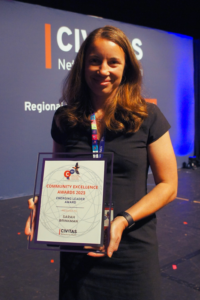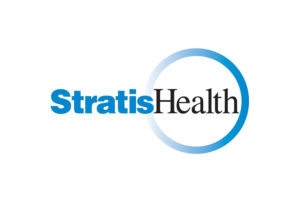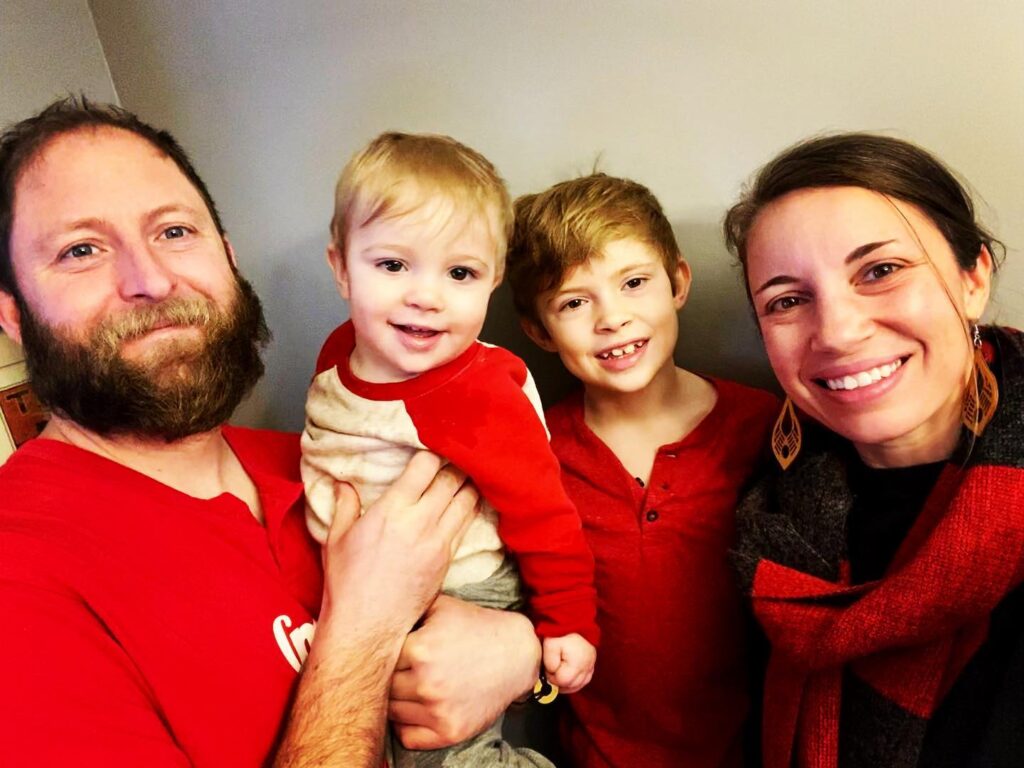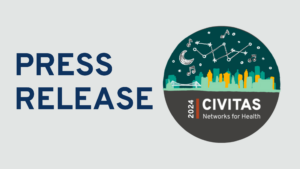Written by Malik Chambers
Meet Sarah Brinkman
We are pleased to introduce Sarah Brinkman, a distinguished health care leader who is a program manager at Stratis Health, an independent nonprofit. In addition to her role at Stratis Health, Sarah serves as the Chair on the Civitas Networks for Health Emerging Leaders Council (ELC). The ELC provides rising leaders across the Civitas network with opportunities to connect with peers and other national leaders on topics related to leadership development while also continuing to explore ways to link health data with meaningful health improvement efforts.
With her wealth of experience and dedication to the health care industry, Sarah brings a unique perspective and a deep commitment to driving positive change in health care. We had the privilege of sitting down with her to learn more about her insights and expertise contributing to the ever-evolving health care landscape.
“So often we get theoretical in thinking about how we provide health care and implement policy. Seeing how it impacts the individual after these practices are implemented, for better or worse, keeps me coming back to try to make things better.” -Sarah Brinkman

Hi Sarah! Tell us a little about yourself and what you do at Stratis Health.
The work I do at Stratis Health involves collaborating with health care providers across various care settings to enhance quality outcomes, with a broader vision of improving community health. I’m particularly passionate about health equity and reducing disparities, and often my work is focused on rural communities. My background includes working with community-based organizations addressing women’s health, at-risk youth, domestic violence, and sexual assault. In all things I’m really driven by a commitment to social justice and equitable access to quality health care, regardless of location or identity.
I noticed that your organization is headquartered in Minnesota but has a national reach. How is this possible?

Yes, Stratis Health is based in Minnesota, but our reach is much broader than that. We implement programs at the community, state, regional, and national level, and have a mix of funding sources including federal government, foundations, and direct fee for service that allow us to have a national reach.
Much of our rural focused work has been funded through the Federal Office of Rural Health Policy, reaching rural providers across the country. Currently, I am a program director for the Superior Health Quality Alliance QIN QIO (Quality Innovation Network-Quality Improvement) funded through the Centers for Medicare & Medicaid Services (CMS).
Can you tell us a bit more about Stratis Health’s work to improve rural health?
Stratis Health has a long history of working with rural communities to improve health outcomes. We work with small rural hospitals, including critical access hospitals (25 beds or fewer), federally qualified health centers, and rural health clinics; we also work with nursing homes and have helped rural communities establish palliative care programs. Many rural health facilities are exempted from formal quality reporting and requirements by CMS due to their unique payment structures, lower patient volumes, and geographic isolation.
However, the health care landscape is shifting towards value-based care, regardless of CMS payment status and it’s crucial for these rural facilities to demonstrate their quality care not only because it’s what is best for their community, but also so they can negotiate effectively with third-party payers, irrespective of their CMS provider designation.
In addition to improving outcomes for rural residents, our goal is to ensure that these providers remain relevant in health care environments evolving towards value-based care. Many rural hospitals with lower patient volumes risk closure if they cannot stay competitive and accessible in their communities.
Sarah, you wear multiple hats –your position at Stratis Health, Chair of the Civitas ELC, and Civitas Board Member. Tell us more about your role with the ELC.
In my role within the Civitas Emerging Leaders Council, my primary responsibility is to represent Stratis Health, which functions as a Regional Health Improvement Collaborative (RHIC)* within the Civitas network. This role allows me to engage with like-minded individuals and organizations in the health care sector who share a commitment to improving health care delivery and outcomes.
One of the driving forces behind my participation in the Emerging Leaders Council is my genuine passion for leadership development and my personal quest to enhance my effectiveness as a leader within the health care realm. I firmly believe that effective leadership is a key driver for positive change in the health care industry, and I am dedicated to exploring various strategies and approaches to make meaningful impacts.
What makes this council particularly exciting and rewarding for me is the opportunity it provides to connect with organizations that differ significantly from Stratis Health, such as Health Information Exchanges (HIEs). These organizations may specialize in areas, services, or approaches that are distinct from what we do at Stratis Health. Engaging with these diverse organizations allows me to broaden my horizons, gain exposure to different perspectives, and develop a more comprehensive understanding of the health care landscape. It also enables me to form connections with leaders who occupy similar roles within their respective organizations but employ distinct strategies and approaches.
This cross-pollination of ideas and experiences is invaluable, as it encourages me to think both strategically and innovatively. By interacting with leaders from various backgrounds, I gain insights into novel methods, creative solutions, and innovative practices that I might not have encountered within my own organization. It fosters a spirit of collaboration, where we collectively envision the future of health care. Importantly, this collaborative effort is aimed at shaping a future that hasn’t been fully imagined yet, ensuring that health care remains adaptive, innovative, and responsive to the evolving needs of patients and communities.
My participation in the Civitas Emerging Leaders Council is a dynamic opportunity for personal and professional growth, as well as an avenue for Stratis Health to contribute to the broader health care community and actively participate in the co-creation of a more innovative and patient-centered future for health care delivery. Along these lines, I joined the Civitas Board in 2023 as the ELC member representative. Being liaise between the ELC and Civitas Board is incredibly important. The ELC supports leadership development among rising leaders in our industry which is needed more than ever. Being the voice of this group on the national Board not only helps strengthen the diversity of perspectives being represented but it also displays Civitas’ commitment to leadership development and governance.
You mentioned your experience collaborating with community-based organizations. How did your former role shape your current career?
Early in my career, I worked for a sexual assault organization as a victim advocate. In that role, I oversaw the implementation of a unique community-based Sexual Assault Nurse Examiner (SANE) program in collaboration with two large health care providers. My job was to help these providers implement the program in local hospitals.
Historically, when sexual assault victims arrived at the hospital for a forensic exam, some emergency room providers were untrained, uncomfortable, or even unwilling to handle these cases. This placed an additional burden on victims following a traumatic event. Through the SANE program, we recruited health care professionals willing to be trained and work in this capacity.
This experience gave me insights into the health care system, its obstacles, and how policies and procedures can hinder or support quality outcomes. For example, among the many challenges to implementation was developing ways to facilitate the necessary documentation for a medical forensic exam. Although my current role is less focused on direct care, my passion remains fueled by the patient’s experience. Understanding the impact of health care on individuals and communities, whether for better or worse, drives my commitment to improving health care. So often we get theoretical in thinking about how we provide health care and implement policy. Seeing how it impacts the individual after these practices are implemented, for better or worse, keeps me coming back to try to make things better.

Conclusion
Sarah Brinkman’s journey in the health care industry underscores her dedication to positive change and equitable health care. Her role at Stratis Health, along with her active involvement in the Civitas Emerging Leaders Council and Civitas Board, demonstrates her commitment to improving quality outcomes and reducing disparities, especially in rural communities. By collaborating with diverse organizations on a national scale, she ensures the relevance of health care providers in an evolving landscape. Sarah’s background in community-based organizations has provided her with a unique perspective on the practical impact of policies on individual patients. Her drive to improve health care serves as an example of leadership and innovation, shaping a more patient-centered and adaptive future for health care delivery.
*Regional Health Improvement Collaborative (RHIC) – Regional Health Improvement Collaboratives (RHICs) A RHIC provides a neutral, trusted mechanism through which the community can plan, facilitate, and coordinate the many different activities required for successful transformation of its health care system. A RHIC does not deliver health care services directly or pay for such services.
For more information, please visit stratishealth.org.




